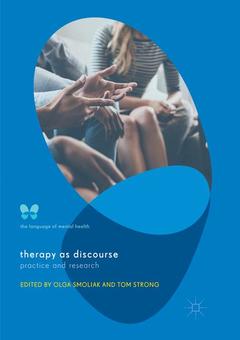Description
Therapy as Discourse, 1st ed. 2018
Practice and Research
The Language of Mental Health Series
Language: English
Subject for Therapy as Discourse:
Therapy as Discourse
Publication date: 12-2018
Support: Print on demand
Publication date: 12-2018
Support: Print on demand
Therapy as Discourse
Publication date: 08-2018
Support: Print on demand
Publication date: 08-2018
Support: Print on demand
Description
/li>Contents
/li>Biography
/li>Comment
/li>
This book addresses the premise that therapy can be understood, practiced, and researched as a discursive activity. Using varied forms of discourse analysis, it examines the cultural, institutional, and face-to-face communications that shape, and occur within, therapies that are discursively understood and practiced. By first providing an overview of commonalities across discursive therapies and research approaches, the authors discursively examine general aspects of therapy. Topics explored include subjectivity, psychological terms, institutional influences, therapeutic relationships, therapists? ways of talking and questioning, discursive ethics, and assessment of therapeutic processes and outcomes. This book offers a macro-analysis of the conversational practices of a discursively informed approach to therapy; as well as a micro-analysis of the ways in which language shapes and is used in a discursively informed approach to therapy. This book will interest practitioners seeking to better understand therapy as a discursive process, and discourse analysts wanting to understand therapy as discursive therapists might practice it.
Chapter 1. Introduction to discursive research and discursive therapies; Tom Strong & Olga Smoliak.- Chapter 2. Discourse in psychotherapy: Using words to create therapeutic practice; Jarl Wahlström.- Chapter 3. Researching the discursive construction of subjectivity in psychotherapy; Evrinomy Avdi & Eugenie Georgaca.- Chapter 4. The alliance as a discursive achievement: A conversation analytical perspective; Adam Horvath & Peter Muntigl.- Chapter 5. Discursive therapies as institutional discourse; Gale Miller.- Chapter 6. Reflexive questions as constructive interventions: A discursive perspective; Joaquin Gaete Silva, Olga Smoliak, & Shari Couture.- Chapter 7. Transforming gender discourse in couple therapy: Researching intersections of societal discourse, emotion, and interaction; Carmen Knudson-Martin, Jessica ChenFeng, Aimee Galick, Elsie Lobo, Sarah K. Samman, & Kirstee Williams.- Chapter 8. Conversation analysis, discourse analysis and psychotherapy research: Overview and methodological potential; Eleftheria Tseliou.- Chapter 9. Discourse ethics in therapeutic encounters; Olga Smoliak, Tom Strong, & Robert Elliott.- Chapter 10. Discursive research from an assimilation model perspective; William Stiles.
Olga Smoliak is an Associate Professor in Couple and Family Therapy at the University of Guelph, Canada. She uses conversation analysis and discursive psychology to investigate how psychological matters are constituted discursively. Olga has studied interactional methods used in therapy to give advice, collaborate, accomplish therapeutic tasks, and negotiate responsibility for blameworthy conduct.
Tom Strong is a Professor, couple and family therapist, and counsellor-educator at the University of Calgary, Canada. Tom researches and writes on the collaborative, critically-informed and practical potentials of discursive approaches to psychotherapy.
Brings together discursive researchers and discursive therapists
Offers insights into psychological discourse in terms of subjectivity, reflexivity, institutional discourses, gender and ethics
Analyses how therapy can be practised and understood as a discursive activity
© 2024 LAVOISIER S.A.S.




